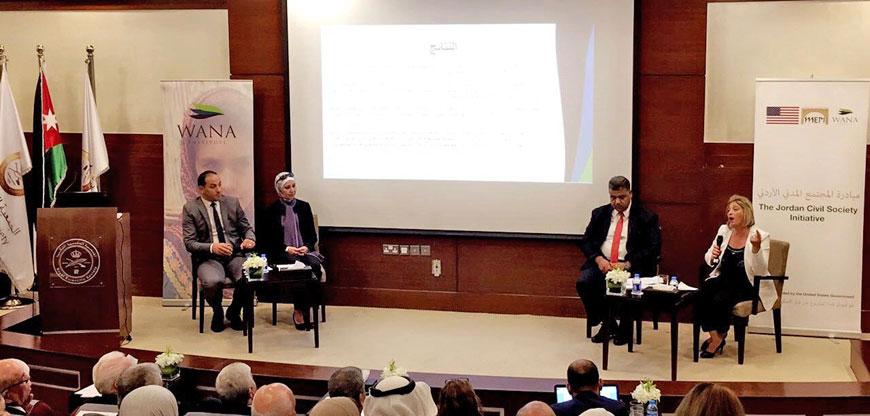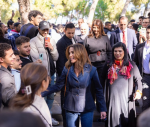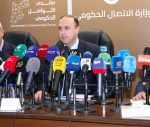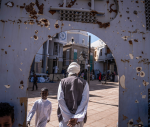You are here
‘Human capital is Jordan’s most precious resource’ — Prince Hassan
By Camille Dupire - Apr 15,2018 - Last updated at Apr 15,2018
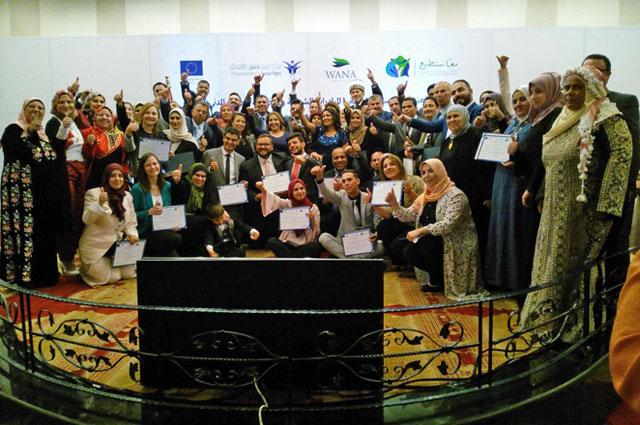
Participants in the project pose for a group photo during the closing ceremony in Amman on Sunday (Photo by Camille Dupire)
AMMAN — Representatives from 80 Community Based Organisations (CBOs), youth initiatives and think tanks on Sunday gathered to celebrate the conclusion of the EU funded “Civil Society project” carried out by the West Asia-North Africa (WANA) Institute and the National Centre for Human Rights under the patronage of HRH Prince Hassan.
In his keynote address to the audience, the chairman and founder of WANA stressed the importance of human capital, “Jordan’s most precious resource”. “It is high time we divide the responsibilities between the public sector, private sector and civil society equally. It is time for Jordan to focus on empowering its youth, women and refugee population,” the prince said, voicing his appreciation to the donors and international agencies for their support to Jordan’s civil society.
Participants in the project briefed the audience on their personal experiences, outlining the different capacity-building workshops they undertook in the fields of community development, human rights, research methods, problem assessment, strategic management, project design and proposal writing, monitoring and evaluation, and advocacy.
Twenty-six year old Suhaib Al Fayoun from Aqaba recalled: “The session on project management was very interesting. I learned how to write reports and plan strategically, which will improve the quality of our initiative.”
Meanwhile, Tafileh resident Khloud Saharneh, 32, remembered how unsure of herself she was when he co-founded an association for children with autism one year ago. “It’s my first experience working for a CBO, so this series of workshops was very useful. I learned a lot from the human rights session,” she said.
She raised the issue of the lack of funding available to CBOs, saying “The first year, you need to finance the project yourself and then you might find someone to fund you.”
Civil society team leader at the WANA Institute Mahmoud Nabulsi, responded that “in the future, we want to work on linking the CBOs and youth initiatives with potential donors” .
The ceremony covered a number of related topics including Jordan’s development priorities, the role of CSOs in protecting human rights, the needed policy reforms, and ways to increase policy dialogue opportunities for youth.
EU Ambassador to Jordan Andrea Fontana commended the project for empowering civil society organisations (CSOs) in Jordan, stressing on their vital role in promoting sustainable development and achieving national priorities.
“This programme has given CBOs the opportunity to work together across governorates,” Fontana stated, reiterating the EU’s commitment to promoting “meaningful and structural participation” and increasing the capacity of CSOs, notably in the public debate.
The conclusion of the project does not mean that the journey is over though, stressed Nabulsi, who said “actually implementing the policy recommendations that came out of this project is a challenge that lies ahead”.
He pointed to a number of issues facing CBOs such as the high staff turnover which “causes a huge loss of knowledge within certain organisations”.
Nabulsi concluded by urging for continued support to civil society in Jordan, noting that “the sector is a major service provider to citizens and refugees, advocates for policy change, and fulfills an important watchdog function”.
Related Articles
AMMAN — Twenty two Community-Based Organisations (CBOs) from Karak, Zarqa, Mafraq and Amman this week completed a series of capacity-buildin
AMMAN — The West Asia – North Africa (WANA) Institute on Tuesday launched its advocacy strategy for Civil Society Organisations (CSOs): Towa
AMMAN — Over the next seven months, 60 Jordanian Community-Based Organisations (CBOs), five policy NGOs and five think tanks will take part


